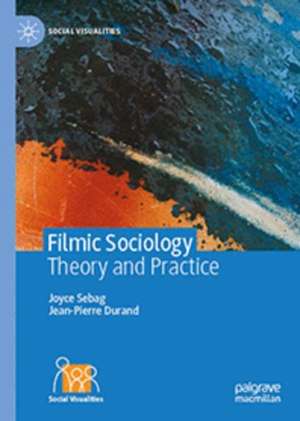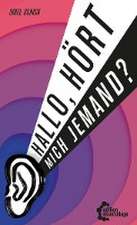Filmic Sociology: Theory and Practice: Social Visualities
Autor Joyce Sebag, Jean-Pierre Duranden Limba Engleză Hardback – 10 ian 2024
Illustrated with numerous photographs that mark the history of documentary photography and film, the book is intended for both teachers-researchers and students in all disciplines of the humanities and social sciences who practice video and photography or wish to discover their uses. Students in documentary and film schools, as well as students on information and communication programs will also benefit from the book.
Preț: 728.11 lei
Preț vechi: 887.94 lei
-18% Nou
Puncte Express: 1092
Preț estimativ în valută:
139.33€ • 148.99$ • 116.17£
139.33€ • 148.99$ • 116.17£
Carte tipărită la comandă
Livrare economică 18 aprilie-02 mai
Preluare comenzi: 021 569.72.76
Specificații
ISBN-13: 9783031336959
ISBN-10: 303133695X
Pagini: 232
Ilustrații: XXI, 232 p. 41 illus., 10 illus. in color.
Dimensiuni: 148 x 210 mm
Greutate: 0.46 kg
Ediția:1st ed. 2023
Editura: Springer International Publishing
Colecția Palgrave Macmillan
Seria Social Visualities
Locul publicării:Cham, Switzerland
ISBN-10: 303133695X
Pagini: 232
Ilustrații: XXI, 232 p. 41 illus., 10 illus. in color.
Dimensiuni: 148 x 210 mm
Greutate: 0.46 kg
Ediția:1st ed. 2023
Editura: Springer International Publishing
Colecția Palgrave Macmillan
Seria Social Visualities
Locul publicării:Cham, Switzerland
Cuprins
Introduction.- The approach of filmic sociology.- From ethnologist photography to filmic sociology.- Cinema and sociology: a promising hybridization.- Cinema enhances sociological questions.- Showing the invisible in the sociological documentary.- Conclusion.
Notă biografică
Joyce Sebag is Professor Emeritus of Sociology at the Centre Pierre Naville, University of Evry Paris-Saclay, France, where she created the Master Image et Société and supervised several theses in filmic sociology.
Jean-Pierre Durand is Professor Emeritus of Sociology at the University of Evry Paris-Saclay, France, where he founded the Pierre Naville Center. He has published several books on sociology of work with Palgrave.
Textul de pe ultima copertă
This book is an exploration of the intellectual resources offered by the hybridization of sociology and cinema: practicing sociology, or other human sciences, through images and sound. In the age of the image, this essay invites sociological research, not only through the discipline's approach, but also through the joint learning of techniques (shooting and sound recording, derushing, editing, etc.) and film writing.
Using concrete examples, the authors analyze what it means to think through the image, explain the different phases of making a sociological documentary, and question, through sociological film, the representations of reality and, more specifically, what remains invisible in the social world. The result is a reflective look at the theories and practices presented, to better equip the sociologist-filmmaker.
Illustrated with numerous photographs that mark the history of documentary photography and film, the book is intended for both teachers-researchers and students in all disciplines of the humanities and social sciences who practice video and photography or wish to discover their uses. Students in documentary and film schools, as well as students in information and communication programs, will also benefit from the book in their studies.
Illustrated with numerous photographs that mark the history of documentary photography and film, the book is intended for both teachers-researchers and students in all disciplines of the humanities and social sciences who practice video and photography or wish to discover their uses. Students in documentary and film schools, as well as students in information and communication programs, will also benefit from the book in their studies.
Caracteristici
Timely rethinking of the role of the films in the sociological imagination Extends our understanding of the intangible Highlights the need for film practitioners and sociologists to converge



















